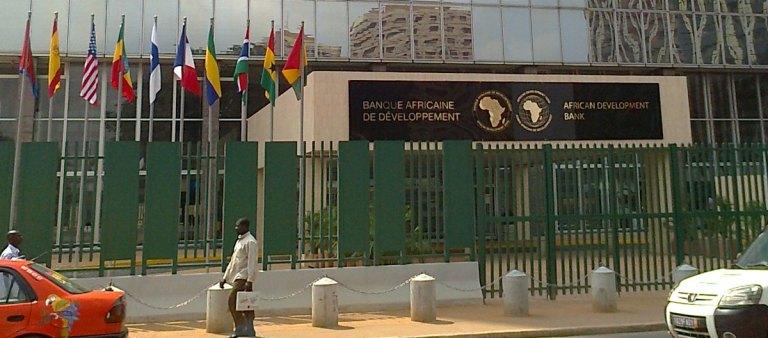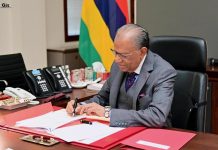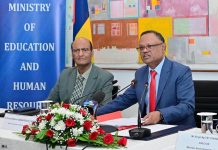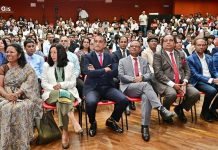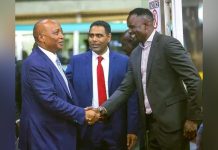Africa-Press – Mauritius. Before the bursting of the Saint-Louis Gate, an alleged corruption case where the Danish firm Burmeister & Wain Scandinavian Contractor (BWSC) allegedly paid bribes to obtain the contract to install motors at the CEB’s thermal station , the name of the African Development Bank (ADB) was not known outside informed circles (government, press, banks).
Since then, it has become notorious (a “household name”, as one would say in English) at the whim of the political and financial scandal which would affect the government as well as an opposition party. This notoriety, however, goes beyond the Mauritian framework.
Indeed, the AfDB has made international headlines with the establishment of an independent investigation into the accusations of prevarication and nepotism that have been leveled against its president, the Nigerian Akinwumi Adesina.
There is, a priori, no link between the ADB’s approach to the report on the Saint-Louis Gate and the setbacks of its president. However, it is necessary to situate the events in their own perspective in order to better understand the turmoil in which the AfDB finds itself.
In 2015, the ADB granted a loan of Rs 4.3 billion to the CEB in order to finance the redevelopment project of the Saint-Louis station, carried out by the BWSC. It should be noted that it was not the AfDB that discovered the pot aux roses in the corruption case.
It was the BWSC itself which had, in February 2019, informed the AfDB that its employees had bribed members of the Mauritian administration in order to obtain confidential information allowing it to offer a tailor-made bid for the project.
of the CEB during a call for tenders in 2015. Following the revelations of the BWSC, the Office of Integrity and Anti-Corruption (OIAC) of the ADB had made an evaluation of the BWSC report, the results of which were announced in its press release of June 8, 2020.
Confidentiality? Sanctioned for the act of corruption, the BWSC agreed to forgo the right to bid on AfDB-funded projects for one year. However, it is not known if the Danish firm really signed a non-disclosure agreement with the ADB that did not allow either party to reveal the details of this corruption case to a third party, in this case the Government of Mauritius.
.
Following the AfDB press release, the prime minister said the institution would only share its report with an official investigative body like the ICAC.
When the ICAC requested a copy of the OPCW report from the ADB, it was dismissed. The Prime Minister then wrote to the President of the ADB, Mr. Akinwumi Adesina, asking him to exert his influence with the OPCW with a view to getting him to share his report with the Government.
Mr. Adesina has been kind. Result: the Prime Minister said to have received a “document” from the ADB (letter or summary of the report) which would mention the names of the incriminated persons, including the leader of the ML and the leader of the MMM.
In parliament, the PM insisted he could not make the document public due to its “confidential nature”. However, he did reveal two names that would be mentioned there, among many others.
Where is the confidentiality then? The Prime Minister even invited the Leader of the Opposition, not the leader of the MMM, to read the supposedly confidential document, which Arvind Boolell refused to do, sensing a trap.
In addition, it should be noted that the Prime Minister contacted the President of the ADB at a time when he is facing two difficulties. First, he is engaged in a campaign to be re-elected as head of this institution for a second term.
Adesina is the eighth elected president of the AfDB since May 28, 2015 and he is the sole candidate for his own succession, which is expected to be decided in August 2020.
Second, he is being independently investigated into allegations of bad governance against him. AfDB President challenged The AfDB is a regional development bank whose mission is to promote the investment of public and private capital in development projects in Africa.
The AfDB is controlled by a Board of Governors, comprising representatives of member countries (shareholders). Votes on the council are split between 54 African countries (60%) and 27 non-African countries in Europe, America and Asia (40%).
Although the AfDB is a regional bank, it is not controlled by African countries. Nigeria is the AfDB’s largest shareholder, but the United States is the second largest shareholder and, along with other Western member countries, wields a strong influence.
Mr. Adesina’s candidacy is strongly contested by the United States, which accuses him of bad governance during his first term. In January 2020, whistleblowers sent a report to two AfDB governors and OPCW director Alan Bacarese, making 20 allegations against Mr.
Adesina. These allegations relate to favoritism in many appointments of senior officials, especially Nigerian compatriots, and the appointment or promotion of those suspected or convicted of fraud or corruption. Mr. Adesina was quickly exonerated by the AfDB on the basis of a report from its internal ethics committee.
At the request of the United States, the Board of Governors of the AfDB announced on June 4 the launch of an independent investigation to clarify the accusations, thus calling into question the work of the ethics committee.
In a letter dated May 22, United States Secretary of the Treasury Steven Mnuchin wrote: “We fear that the wholesale dismissal of all allegations without appropriate investigation will tarnish the reputation of this institution as one that does not uphold high standards of ethics and governance.
” Former Irish President Mary Robinson is chairing the expert panel for the independent inquiry and she is due to report “within two to four weeks at most,” according to the AfDB statement.
AfDB member states will vote on Mr. Adesina’s single candidacy at the end of August. To win, he must obtain a double majority, both among African members and non-African members.
This, in light of recent developments, is not a given. Some will blame US criticism of Adesina on the US administration’s anti-multilateralism, symbolized by its attacks on WHO in the wake of the pandemic.
It is true that the isolationism of the United States globally diminishes its moral authority. But this should not evade the governance problems that plague some international organizations, whose bureaucracy gobbles up a lot of resources.
Transparency required In the Saint-Louis affair, one does not understand the refusal of the ADB, as alleged by the Prime Minister, to share or make public the report of the OPCW in the interest of transparency. Africa is a continent struck by the corruption of its rulers and elites while poverty rages on it.
We know the cases of Bongo, Mobutu, Dos Santos and other Sobrino who dipalidated public funds, bought castles in the West and transferred illicit funds to bank accounts in Switzerland through fictitious companies created in tax havens.
Public procurement is an area where African elites enrich themselves by bending the rules to favor bidders who grease their paws. If the AfDB is convinced of its evidence of corruption in the CEB case, it should reveal it in the name of transparency. The non-disclosure agreement with the BWSC shouldn’t be a hitch if the BWSC is willing to cooperate.
What is the AfDB hiding by wanting to keep the report confidential? Is it sufficient for the AfDB that the corrupters (Westerners) are known and the corrupt (Africans) are not known? Why this double measurement policy? The corrupt are in Africa and we want to protect them by keeping the OPCW report confidential.
Are the corrupters more at fault than the corrupt? This logic is beyond comprehension. All those who are concerned with the imperatives of transparency and accountability in good governance are surprised by the posture of the AfDB. In these circumstances, can we hold it against the United States and other Western countries for wanting the head of the President of the ADB?
For More News And Analysis About Mauritius Follow Africa-Press


